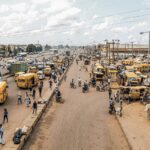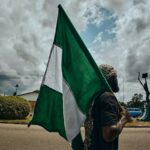Nigeria is the most populous black nation on Earth, rich in diversity and culture with over 300 ethnicities living together across all 36 states and the FCT.
The country is known for its abundant supply of natural and human capital resources.
Nigeria is also the largest economy in Africa and 27th Largest in the world, with a GDP of $442.98 billion as at 2020.
Nigeria’s GDP advanced by 3.98% yoy in the fourth quarter of 2021
The country is projected to be the first African country to reach $1 trillion in GDP by 2030 according to Quartz.
With all this said, the country has the potential to grow thrice as much as it currently is, but several factors play a huge impact on the countries development.
Some of these critical socio-economic issues include:
Poverty:
The Nigerian National Bureau of Statistics revealed in 2020 that 40% or 83+ million Nigerians live in poverty.
Although Nigeria’s poverty profile for 2021 has not yet been released, the World Bank estimated an increase of 42.8% due to the high inflation.
It is estimated that the number of poor people will increase to 90 million, or 45% of the population, in 2022.
According to the NBS Poverty and Inequality Report 2019, there is a Poverty Gap index of 12.85%. Rural areas recorded a poverty headcount rate of 52.1% with a gap index of 17.4% while Urban areas had a rate of 18% with a gap of 4.5%.
The North-East had the highest poverty average with 71.86%.
NBS report indicated that the top six states with the highest poverty rates were; Sokoto (87.73%), Taraba (87.72%), Jigawa (87.02%), Ebonyi (79.76%), Adamawa (75.41%), Zamfara (73.98%)
While the six states with the lowest rates were ; Lagos (4.5%), Delta (6.02 %), Osun (8.52 %), Ogun (9.32 %), Oyo (9.83 %), Edo (11.99 %).


Inflation:
Nigeria’s Inflation rose from 12.3% in January 2020 to 15.4%. November 2021 and 15.63 in Dec ’21.
According to SBM Intelligence, 10,366 Nigerians were killed in 2021 by terrorists ranging from Boko Haram, ISWAP, armed herdsmen and the North West Bandits.
As at April 2022, the country’s inflation rate rose to 16.82%, constantly increasing the cost of goods and services and eroding the purchasing power of citizens.
Insecurity:
The state of insecurity in the country has worsened over the past years; with Boko Haram Separatists, Herder-farmer clashes, Religious and Tribal fanatics, cultists and theft amongst others, there has been an increased fear in the heart of the people. The rate at which citizens are attacked, killed and kidnapped continues to be alarming and is truly petrifying.
According the the Nigeria Security Tracker by the Council on Foreign Relations’ Africa program, at least, 2,968 people were killed while 1,484 were abducted in Nigeria from January to March 2022.
Although the he Nigerian Financial Intelligence Unit stated that they uncovered 96 financiers of terrorism, including 424 associates/supporters of the financiers in February 2022, Nigerians still await drastic actions and results for these individuals
Healthcare:
Nigeria has an estimate of 206 million people, with the highest youth population in Africa (median age of 18.1).
According to the U.S International Trade Administration, the healthcare industry is valued at over $18 billion, with demand for services expected to increase over the next five years.
As of April 2021, The National Bureau of Statistics revealed that the composite consumer price index (inflation) for health surged by 15.9%, reaching a ten year high.
Urban health inflation skyrocketed to 16.7%, while rural health inflation tallied behind at 15.1% for May 2021.
According to the NBS, this sector only contributed N484billion to Nigeria’s GDP in 2020, making up about 0.7% of Nigeria’s GDP. but is valued at over $18 billion (N9.9trillion).
According to the World Bank, Nigeria’s public spending on health care amounts to just 3.03% of its $440 billion GDP (est)
The government’s spending on healthcare was estimated to reach N1.47billion as at 2021, Out-of-pocket payments as proportion of total health expenditure 70.5% and The spending on private healthcare was estimated to reach N4.28 billion as at 2021
Number of Doctors:
As at 2019, the number of doctors decreased to 24,640 (est) from 44,021 in 2018 and has continued to decrease due to foreign attractions
N576 billion ($1.2 billion) is lost to medical tourism yearly in Nigeria.



Nigeria’s Healthcare Budget:
Over the years, stakeholders have decried the low allocation for healthcare in the country. In 2021, N380.21 billion | $100.131 million was allocated to this sector.
The President signed the N17.16 trillion budget for 2022 in December 2021 and submitted the supplementary budget of N2.55trillion on the 15th of February 2022.
However, the sectoral breakdown of the budget has indicated that N724 billion (4.2 %) was allocated for healthcare across the 36 states and the Federal Capital Territory.
With Nigeria’s constant growth in population, the high mortality rate of 34.25 deaths per 100 population and socio-economic issues such as poverty and unemployment, there is a dire need for increased developments and investments in this sector for accessible, affordable and quality services.
Nigeria’s Mortality Rate:
Birth Rate: 37 births per 1000 people
Nigeria’s birth rate fell has fallen from 41 live births in 2011 to 37 live births in 2021.
Death Rate : 11 .1 deaths/1,000 people
Nigeria’s death rate decreased 14 per 1000 people in 2011 to 11.3 in 2021.
Maternal Mortality:
According to the United Nations Economic Commission for Africa, one in seven global maternal deaths occur in Nigeria. That is more than 50,000 women dying per year in Nigeria. (95 % of these deaths during childbirth are preventable)
Unemployment:
Nigeria with a population of 206million+ and labour force of over 80 million+, unemployment rose from 27.10% in Q2 of 2020 to 33.30% in Q4 2020.
According to a 2021 Global Unemployment report by Bloomberg, Nigeria had the third highest unemployment rate on a global list of 82 countries as the jobless rate increased.
Infrastructure:
Nigeria is a developing country, with infrastructure & power being a major challenge for both individuals and organizations.
The road system is the most important means of transportation in the state, carrying an estimated 95% of the country’s goods and passengers, according to Nigeria’s Infrastructure Report Card, 2021
The country lacks a steady power supply, which significantly affects the operations of individuals and businesses.
Although the Buhari Administration has performed in certain areas of this sector some of which are e.g Road and Rail infrastructure, amongst others, Nigeria still has a long way to go in further expanding this from the Urban to Rural areas and maintaining them efficiently.
Corruption:
Despite promises by various past and present political administrations to curb corruption in the country, this issue has remained a looming dark cloud over Nigeria and its people.
During this current administration, critical figures in power were alleged of theft and Fraud, some of which included: Abba Kyari’s Drug Bribery and Drug Cartel case, a Former Managing Director of the NDDC Nsima Ekere,alleged contract fraud to the tune of N47bn, Nigeria’s accountant-general Ahmed Idris alleged N80 billion fraud to mention a few.
Oil:
NNPC in 2020 disclosed that Africa’s top oil exporter, processes almost no crude oil. It was reported in August 2021 that Nigeria’s Oil refineries recorded a total loss of N104.3bn in 13 months within the periods of February 2020 to February 2021, even as the facilities refined no crude oil throughout the period.
According to a Dataphyte review of the NEITI Oil and Gas industry report, over 270 million of Nigeria’s commercial crude oil production was lost to theft and sabotage between 2016 and 2020.
Also, according to OPEC, Nigeria’s oil output was 1.39 million barrels per day (bpd) in January 2022 – 260,000 barrels below its production quota of 1.68 million barrels per day in January.
Nigeria’s oil output further dropped to 1.219million barrels per day, bpd, in April 2022.
OPEC officially increased Nigeria’s oil production quota to1.772mbpd for June 2022 and the country has fallen short of reaching this target as it continue’s to decline in production.
The Nigerian Upstream Petroleum Regulatory Commission (NUPRC) in April stated that s the country lost about $3.27 billion worth of crude oil to theft between January 2021 and February 2022.
The Entrepreneur and Businessman, Mr. Tony Elumelu who acquired 55% of the OML 17 license block in the Niger Delta also lamented the fact that Nigeria was losing over 95% of its oil production to theft in March.
Agriculture:
According to the World Bank, Agriculture contributes 34.66% to Nigeria’s Total Employment, being the largest employer of labour and income-generating activity in Nigeria and contributed 26.21% to Nigeria’s GDP in 2020.
According to PwC, over 80% of Nigeria’s farmers are smallholder farmers (SHFs) and this accounts for 90% of Nigeria’s agricultural produce.
Although the Agriculture sector is an important GDP and Employment contributor, Agriculture is significantly underfunded with only less than 2% (N136.9bn) of Nigeria’s Total Budget allocated to this sector.
Some factors which have affected this sector negativelt includes insecurity, Infrastructure i.e Electricity, Economic Instability such as Inflation, Naira devaluation which affects the purchase of raw materials and Machinery and poor transportation system.